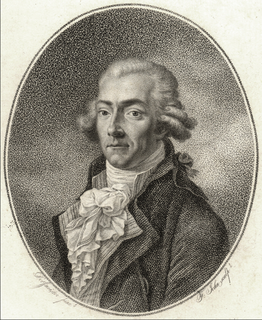Pietro Alessandro Guglielmi was an Italian opera composer.

Lo sposo deluso, ossia La rivalità di tre donne per un solo amante is a two-act opera buffa, K. 430, composed by Wolfgang Amadeus Mozart between 1783 and 1784. However, the opera was never completed and only a 20-minute fragment from act 1 exists.

L'oca del Cairo is an incomplete Italian opera buffa in three acts, begun by Wolfgang Amadeus Mozart in July 1783 but abandoned in October. The complete libretto by Giovanni Battista Varesco remains. Mozart composed seven of the ten numbers of the first act, plus some recitative, as well a sketch of the finale (lost); the extant music amounts to about 45 minutes.

The Jewel Box is a pasticcio opera constructed by Paul Griffiths out of various pieces by Wolfgang Amadeus Mozart. Its mostly English libretto by Paul Griffiths includes new translations of most of the Italian-language texts of the musical numbers. It was premiered by Opera North at the Theatre Royal, Nottingham, on 19 February 1991. The conductor was Elgar Howarth, the director was Francisco Negrin and the designer was Anthony Baker.
Calandrino is a character from Giovanni Boccaccio's the Decameron, in which he appears in four stories. In these tales he is the victim of the pranks of Bruno and Buffalmacco. He becomes a recurring character in Renaissance literature, especially in Italy.
Giovanni Bertati was an Italian librettist.

Le astuzie femminili is a dramma giocoso in four acts by Domenico Cimarosa with an Italian libretto by Giuseppe Palomba. The opera buffa premiered at the Teatro dei Fiorentini in Naples, Italy, on 26 August 1794. The opera was subsequently performed in Barcelona in 1795, Lisbon in 1797, Vienna in 1799, Paris in 1802, and London in 1804, remaining popular during the first quarter of the nineteenth century. Although not performed often today, the opera is still occasionally revived and a number of recordings have been made.

La finta parigina is an opera buffa in 3 acts by Domenico Cimarosa with an Italian libretto by Francesco Cerlone. The opera premiered at the Teatro Nuovo in Naples, in 1773.

Giacomo Domenico Mario Antonio Pasquale Giuseppe Tritto was an Italian composer, known primarily for his 54 operas. He was born in Altamura, and studied in Naples; among his teachers were Nicola Fago, Girolamo Abos, and Pasquale Cafaro. Amongst his pupils were the young Vincenzo Bellini around 1821, plus Ferdinando Orlandi. He died in Naples.
Ferdinando Orlandi, also referred to as Orland and Orlando. Little is known of his early life and his year of birth is also cited as 1777. He was an Italian musician and teacher of singing who composed cantatas and sacred music, but was particularly known for his operas, not all of which have survived. He was born and died in Parma.

L'Italiana in Londra is one of eight comic operas, termed intermezzi, which Domenico Cimarosa wrote between 1777 and 1784 for the Teatro Valle, a handsome neo-classical Roman theatre built in 1726, which still stands today.

Francesco Benucci was an outstanding Italian bass/baritone singer of the 18th century. He sang a number of important roles in the operas of Wolfgang Amadeus Mozart and other composers.

Il ritorno di Don Calandrino, also known as Armidoro e Laurina, is an intermezzo in two acts by Domenico Cimarosa to an Italian libretto presumably written by Giuseppe Petrosellini.

Giunio Bruto is a 1781 opera seria in two acts by Domenico Cimarosa to a libretto by Eschilo Acanzio.
Artemisia is the last opera of Domenico Cimarosa. The libretto, in three acts, is by Count Giovanni Battista Colloredo. Cimarosa died on 11 January 1801 before writing the music to Act III; the first performance, given at the Teatro La Fenice in Venice on 17 January 1801, also included interpolations by other hands in the first two acts.









